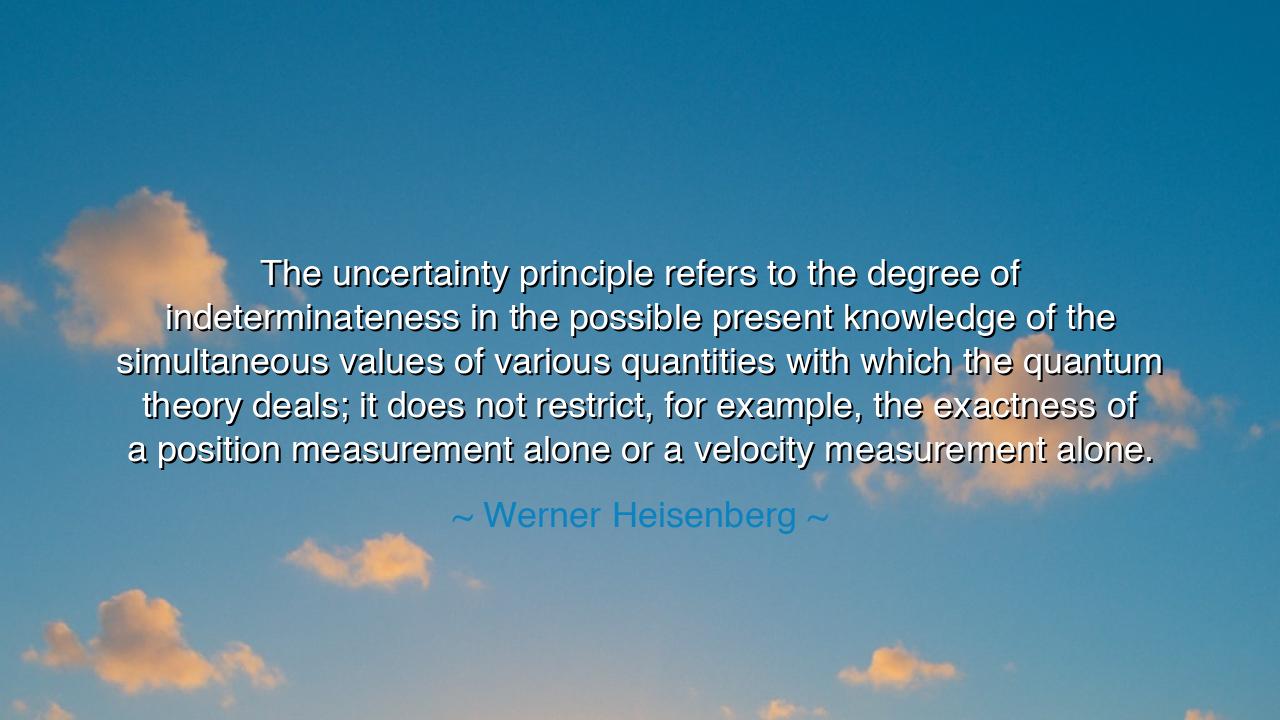
The uncertainty principle refers to the degree of
The uncertainty principle refers to the degree of indeterminateness in the possible present knowledge of the simultaneous values of various quantities with which the quantum theory deals; it does not restrict, for example, the exactness of a position measurement alone or a velocity measurement alone.






“The uncertainty principle refers to the degree of indeterminateness in the possible present knowledge of the simultaneous values of various quantities with which the quantum theory deals; it does not restrict, for example, the exactness of a position measurement alone or a velocity measurement alone.” — thus wrote Werner Heisenberg, the German physicist whose insight shattered the illusion of absolute precision in the universe. In this sentence, which echoes like a verse from the scriptures of science, Heisenberg unveils a truth both mathematical and metaphysical: that certainty itself has limits, and that the very act of knowing transforms what is known. His words are not merely technical — they are a meditation on the nature of existence, perception, and the mystery that lies between the observer and the observed.
The origin of this declaration lies in the birth of quantum mechanics, that strange and beautiful realm where matter no longer obeys the strict commands of classical physics. Before Heisenberg, men like Newton had dreamed of a universe perfectly ordered — where if one knew the position and velocity of every particle, one could predict all that would ever be. But Heisenberg, peering into the subatomic world, discovered something astonishing: that the more precisely we measure one aspect of reality, the less precisely we can know another. If we fix a particle’s position exactly, its momentum blurs; if we know its speed perfectly, its location becomes a haze. This was not a failure of instruments, but a revelation of nature’s deep law: uncertainty is woven into the fabric of being.
Heisenberg’s quote clarifies that the uncertainty principle is not about the inaccuracy of our tools, nor a defect of our methods. It is the recognition that reality itself resists total definition. To measure one quantity is to disturb another; to illuminate one truth is to cast a shadow upon its complement. The universe is not a machine ticking in predictable order, but a living mystery — fluid, relational, and full of hidden depths. Heisenberg thus invites us to abandon the pride of absolute knowing and embrace a humbler wisdom: that knowledge is never complete, and that the search for truth must always include reverence for mystery.
In this, Heisenberg’s discovery mirrors the insights of the ancient philosophers. Heraclitus, long before the age of atoms, declared that all things flow — that one cannot step into the same river twice, for both man and water have changed. The Buddha, meditating beneath his tree, spoke of the interdependence of all phenomena, where nothing stands alone, and everything exists only in relation. And Heisenberg, in the laboratory, found that even the tiniest particles obey this eternal law of flux and relationship. His principle, though born of physics, speaks the language of the soul: that to grasp life, one must also accept its uncertainty.
Consider the story of the navigator at sea, steering through fog and storm. He cannot see the entire ocean, nor predict every wave, but he learns to read the winds, to sense the stars behind the clouds, to act not from certainty but from skill and trust. So too must the seeker in life navigate uncertainty — guided not by perfect knowledge, but by courage, humility, and intuition. Heisenberg’s principle reminds us that perfection of control is impossible, but mastery of awareness is attainable. The sailor does not command the sea; he learns to dance with it. So too, man must learn to live with uncertainty, not as a curse, but as a teacher.
In a world obsessed with certainty — with prediction, measurement, and control — Heisenberg’s insight stands as both warning and liberation. To demand total knowledge is to imprison the universe in our expectations; to accept uncertainty is to open ourselves to wonder. Life, like the quantum realm, reveals itself only to those who do not grasp too tightly. The artist, the lover, the scientist — all must work within this truth. To create, to love, to discover — these are acts not of control, but of trust. And it is precisely in the dance between knowing and not knowing that the beauty of existence unfolds.
The lesson, then, is this: do not fear uncertainty. It is the pulse of life itself. In every question unanswered, in every moment unresolved, there lies potential — the seed of creation, the breath of freedom. Strive for knowledge, yes, but remember that wisdom begins where knowledge ends. When life resists your definitions, do not despair; it is simply reminding you that you are part of something greater than comprehension.
So let the words of Werner Heisenberg echo through your heart: “It does not restrict the exactness of one measurement alone.” For in this truth lies both humility and hope. The universe does not yield all its secrets, but it whispers enough for those who listen. Embrace the mystery, walk boldly in the fog of not knowing, and you will find that uncertainty is not the enemy of truth — it is its gateway.






AAdministratorAdministrator
Welcome, honored guests. Please leave a comment, we will respond soon